
The journey of a thousand li begins with a single step. Our aim is to chronicle every step we take as our community matures in honesty, humility and truth.
A lofty goal perhaps, and one we'll pursue together.
Someday, your story will appear here!
Reflection from Alternative Practicum Experience
Knowledge Built From Everyone
By Matthew Kwan
As part of the educational technology concentration of my teacher training at Queen’s University back in Canada, my professor, Dr Richard Reeve, introduced us to the pedagogical concept of knowledge building (KB). The thought of having an idea-centred classroom instead of one based on teacher-led activities really excited me as an educator. Knowledge building remained really theoretical in my brain however, so when the opportunity presented itself to come to Singapore to get a more concrete understanding of the concept, I knew I had to take it. My time spent here at the Centre for Research in Pedagogy and Practice (CRPP) has been an excellent experience. I’ve made a lot of connections that I’m sure will endure even after I return home. I’ve learned to analyze data in ways I had not done before and read many papers that deepened my understanding of knowledge building while showing me real-life examples of KB in action. The reading and analyzing that I did was all nicely put into perspective by an event that took place during my final week of the alternative practicum.
The Key Event
The Knowledge Building Community Network Learning (KBCNL) event started off strong on the afternoon of March 18, 2024. The seats in the I-Space room of the National Institute of Education (NIE) were quickly filled up. With such high spirits in the air, the only worry I had was whether there would be enough Old Chang Kee left for me to try a (in)famous curry puff when snack time came around.
In all seriousness however, KBCNL was about much more than delicious snacks. The event was genuinely insightful and made me think about my own teaching practice in ways that I had not before. Teachers from both Singapore and China shared ways that they built KB culture in their schools and incorporated its principles into their lessons. Mostly, I was fascinated by the ways some of these teachers engaged their students in KB without the use of technology.
One thing I had never heard about before the event was the “KB Cloud Approach”, as elaborated on by Ms Liyana Saine and Ms Linda Shah from Oasis Primary School, where students would essentially create an offline version of Knowledge Forum (KF). Instead of typing on a computer, students would write their ideas using different coloured pens so that their thoughts could be tracked. Their peers would then add (+), (-), or (?), followed by a comment on each post to mimic build-ons on KF. Importantly, a rule was established that “no comment” or “I don’t know” comments were not allowed in the cloud. Their examples of this approach showed students crossing out their initial responses and writing something new, indicating a progression in their knowledge and the presence of a culture where students are not discouraged by “failures”. Finally, students came to a conclusion as a group, showing a valuable display of community knowledge. In my time as a student teacher in Canada, I’ve had the opportunity to work with young students who had great creative ideas, but who would struggle to navigate computer software. Therefore, this low/no tech approach was quite eye-opening for me, as it was something that had not crossed my mind before. Similarly, Teacher Sulo and Teacher Thein shared their experiences using no-tech KB approaches to teach students as young as kindergarten. Their students were able to identify authentic problems by walking around their neighborhood to explore different issues related to water. Since the problems were authentic to the students, they took ownership of their learning and were heard talking about water and pipes even after the project finished. An intuitive criticism of KB brought up by my classmates back home was that it would not work with the youngest students. My classmates thought there was no way that kindergarten and lower primary school students could take collective cognitive responsibility. This event showed clear evidence that my classmates (and I) underestimated the ability of young children.
On the technology side of things, Mr Andy Ng shared about how something as simple as a word cloud helped his students focus their learning. He stated that creating the word cloud took just one press of a button, a couple seconds total, yet it allowed his students to see what was prominent in their discourse and to create interesting questions that also fit with curricular expectations. Us teachers, we are very aware that time is often like a bar of soap that keeps slipping out of our hands. If a one-second word cloud can help us identify students’ “desire lines of inquiry”, it has great value.
I did not know what to expect of this event, or of my alternative practicum in general, but it proved to be extremely educational. A person can read all they want and develop a great theoretical framework in their minds, but to actually see these real-life examples, elaborated on by practicing teachers, really helped to solidify and consolidate all the knowledge that I’ve gained. I’m not sure when the next time I’ll be in Singapore is, but I’ll be sure to come to another KBCNL if the stars align again.
Reflection on the experiences of a Teacher-Work-Attachment at KBDS
From Classroom to Life: Lessons Learned with KBDS
by Sharon, Lecturer, Republic Polytechnic
My six-month Teacher Work Attachment with the KBDS team was an enriching experience that extended beyond my initial goal of learning about research; the insights I gained were far greater than what I could contribute to the team.
As someone who values efficiency, I have always approached teaching with a systematic precision reminiscent of the punctual Japanese trains. My classes were models of predictability, always starting and ending as planned, much to the delight of my students. However, my entry into KBDS in June 2023 challenged my orderly principles. Confronted with what appeared to be ‘chaos’, I questioned the unconventional method of learning. Yet, after active participation in two KBDS sessions this year, my perspective shifted profoundly.
I now embrace three insights:
Not everything can or should be planned for – Embracing uncertainty has nudged me out of my comfort zone, where stability once reigned. In KBDS, I have learned that unplanned, teachable moments often ignite the most engaging learning experiences, even if they deviate from the original plans. Though I still come to class well-prepared, I now allow for spontaneous detours. Similarly, in life, I have begun to savour the journey rather than hastening towards a destination. While jogging at Kent Ridge Park one day, I realized I was no longer fixated on the distance I was supposed to complete. The jog led me to an impromptu visit to Reflections@Bukit Chandu, where the poignant stories in the museum left a lasting impression on me.
No idea is a bad idea – This has transformed my approach to student feedback. In KBDS, I saw how facilitators were encouraging the students to build on one another’s ideas. Instead of rushing to correct my students, I now think of ways to encourage and build on their ideas. In fact, embracing ideas not only shifted the dynamics in my classroom, it has also opened up opportunities for me in life; I now see possibilities instead of closed doors.
Learning can be ‘messy’ and that is okay – As an educator, I often hoped for my students to grasp concepts immediately. Observing KBDS facilitators patiently journeying with the students was a humbling experience that made me reflect on my own impatience. I believe this experience has gently expanded my patience not only with my students but also with my friends and family members.
To conclude, I have learned to appreciate the magic found in spontaneity and the beauty found in imperfection. I came with the single intent to learn about research but I have gained so much more. I extend my deepest gratitude to my colleagues and friends at the KBDS team. It has been a privilege to journey alongside you. While this marks a farewell for the moment, it is not the final chapter. I look forward to our paths crossing again.
Presidential Award 2023 - An interview with Mr Melvin Chan
Credit: Ministry of Education (2023), https://www.schoolbag.edu.sg/story/the-ideas-never-stop-coming-until-the-bell-rings-how-one-teacher-makes-history-this-riveting
How do you feel being a recipient of the President’s Award for Teachers 2023?
I feel honored, humbled and delighted to be conferred the PAT Award 2023. It gives me a sense of affirmation that what I have done in my teaching profession has significantly and profoundly reaches out in inspiring, encouraging & empowering my students, colleagues, and the fraternity. Together with the commendation received as the global top & final 60 shortlisted educators for this year’s Cambridge Dedicated Teacher Award 2023, these 2 accolades amplifies the embodiment on how my role as an educator can really make a lasting impact and influence on my students when I constantly remember and practice out these 3Ps: my primary purpose as a teacher (to help every youths & learners to know that they are more than capable); the need to continue flaming & blazing my passion in teaching & learning through collaboration & reflection; and finally, that possibilities are endless, infinite, yet… always within reach!
I would want to also take this juncture to express my gratitude to my school leaders, colleagues, students, professors, parents, partners, and the fraternity (both locally and globally) – and certainly my supportive wife-- for their continuous guidance and strong support throughout my teaching journey!
Knowledge Building is the anchor pedagogy that guides your teaching practices. Can you share more about the rationales and how you come to know more about Knowledge Building?
In a world of uncertainties and complexities, it is essential for the youths to be collaborative, critical, and creative learners—dispositions of future-readiness. As I got to know about Knowledge Building (KB) through open classrooms and hearing from students their KB experiences, I am certain and confident that with Knowledge Building being internalized as their way of life both in and out of school, our youths will be fully prepared and empowered to become informed, innovative, and inclusive citizens of tomorrow. What it takes then is for us, educators, to be intentional in contextualizing and conceptualizing the learning experiences for our students in alignment with the building blocks and philosophy of the heart of Knowledge Building.
One of your key strengths is your ability to position Knowledge Building in a way that educators find it viable and feasible to implement it in the classrooms. Can you share some examples of it? Or perhaps the strategies that you have adopted in doing so?
Let me do a simple illustration where you plan to explore on this complex concept known as collaboration (a key element in KB). First, do ask as many questions as possible that relates to the concept such as What is collaboration? How does it look like in class? What are some actions & dispositions that the students need to have to become effective collaborators? After which, you can consider using the CARE technique I had devised based on my years of experience & readings to reframe your responses to the questions in the form of: Catchy Taglines/slogan/principles; Acronyms; Repetitive words &/or Personal Experience (relatedness), the more the merrier! This is how the following 3 statements came about: Every Individual is valuable! Every Idea is Improvable! Every Inquiry is Do-able! which perfectly sums up the fundamental building blocks of a collaborative learning culture. I am glad to share that many educators find these 3 statements useful, practical, and accessible in designing and implementing their KB classes.
How does a Knowledge Building classroom or lesson look like? Let’s hear from Melvin’s students as they share their KB experiences!
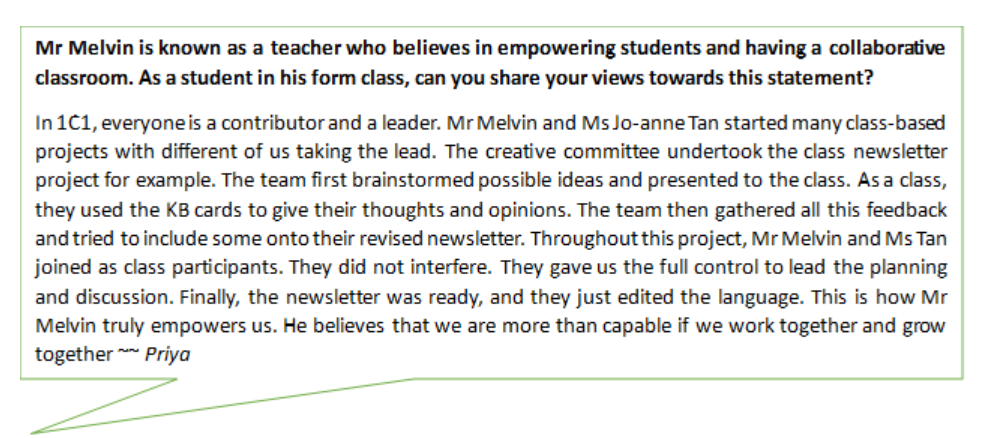

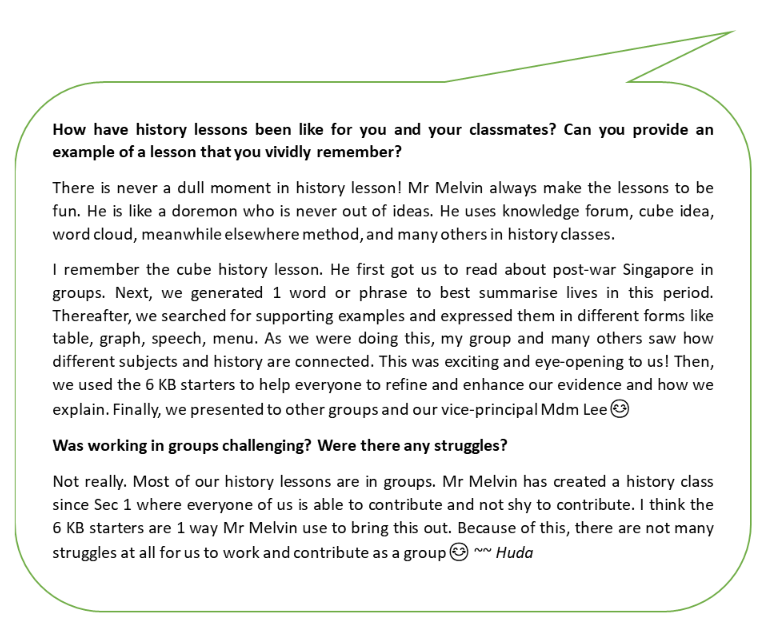
Let’s hear from fellow colleague, Mrs Vena Foo, on how she comes to know about Knowledge Building and the instrumental role that Melvin had played in her KB journey!
In a few words, how would you like to inspire our educators?
I am because we are! As you flip the word we, it becomes me. The power of WE become the potential & possibilities of ME! Let’s collaborate, connect, and contribute. Let’s be a part of a community. Remember that ‘Every Individual is valuable!’ ‘Every Idea is Improvable!’ ‘Every Inquiry is do-able!’
Cambridge Dedicated Teacher Award Nomination Shortlist: Mr Melvin Chan
The Cambridge Dedicated Teacher Awards are a global competition in which current primary or secondary teachers are nominated for something wonderful they have done. A selected panel of judges will then decide on six regional winners who will all appear on a thank you page at the beginning of new Cambridge University Press educational books. They will also win a class set of books of their choice, as well as promotion throughout the year.
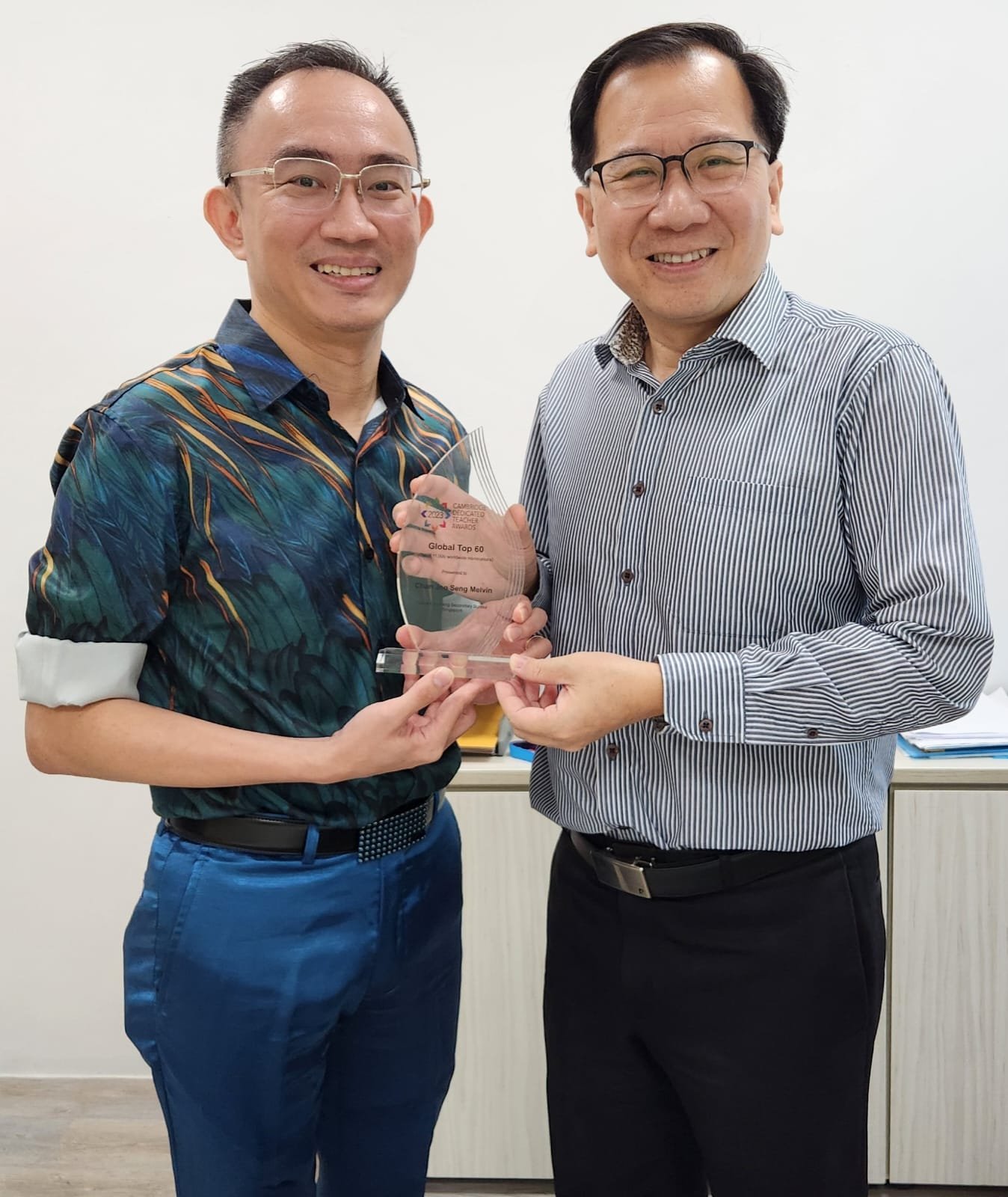
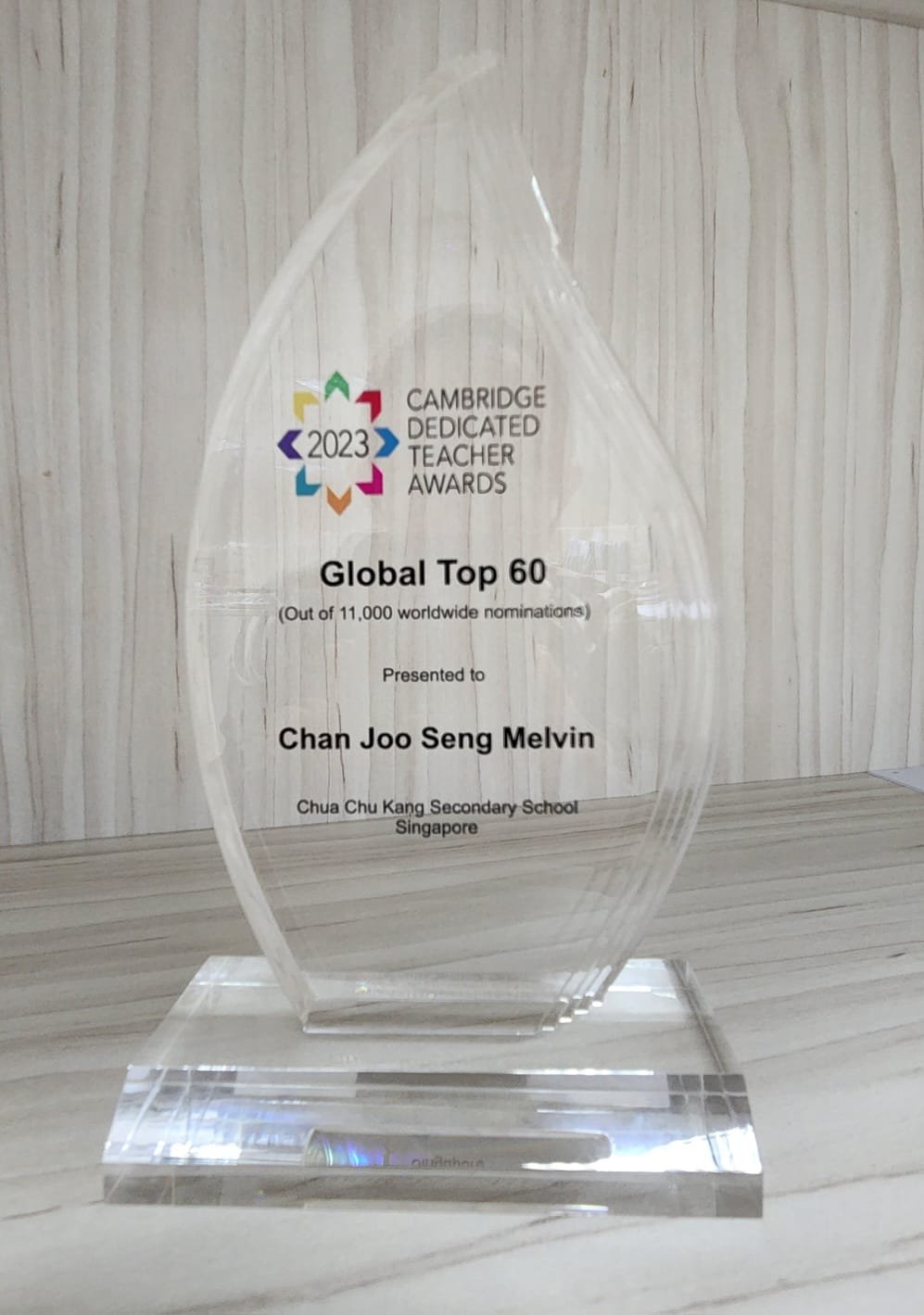
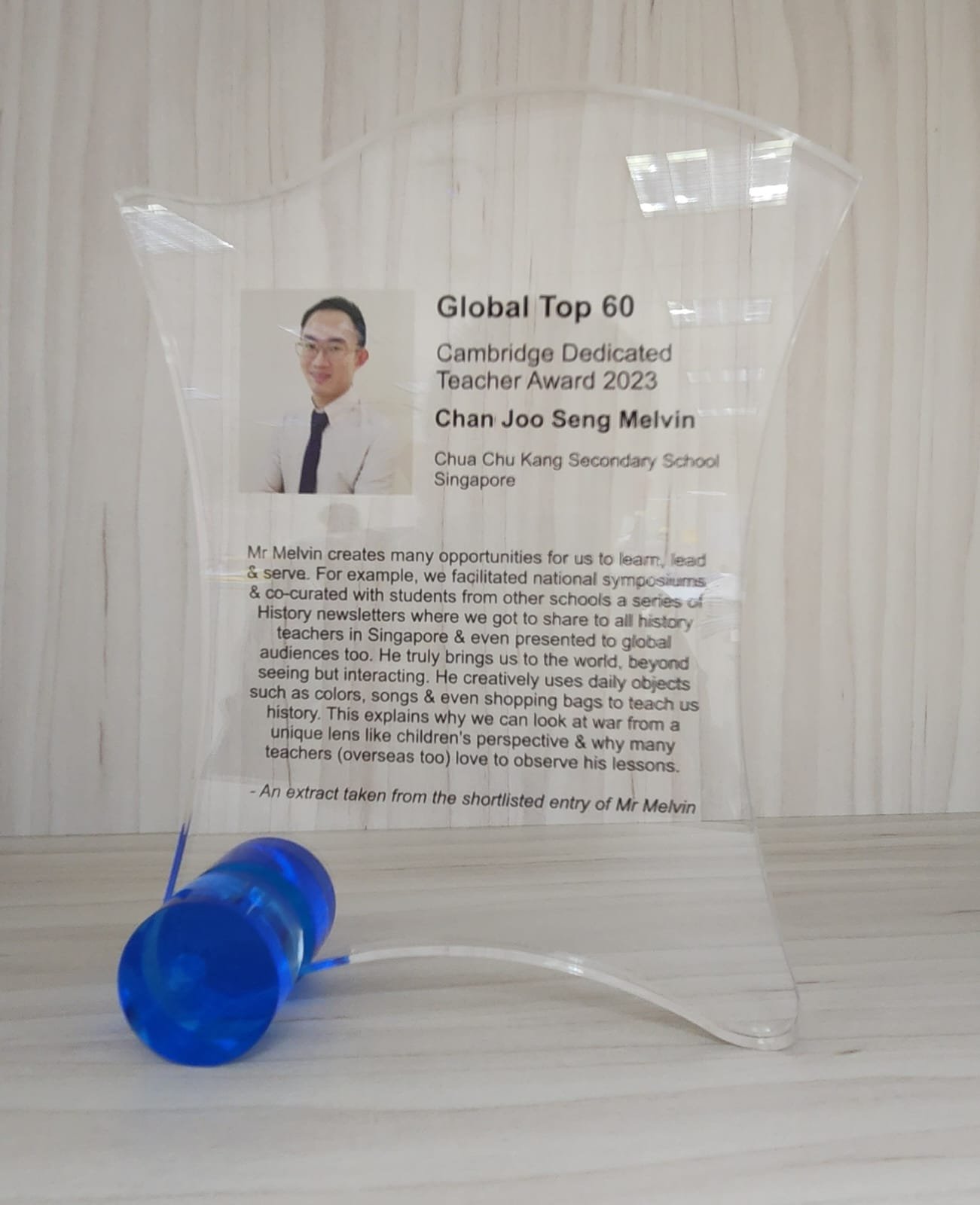
We will like to congratulate one of our KB collaborators and partners, Mr Melvin Chan, for making the shortlist of 60 from a large pool of 11,000 global nominations. This is a great achievement and feat for Mr Melvin as the sole representative from Singapore. His nomination story is shown below and congratulations again to Mr Melvin Chan!
Researchers' KB research and sharing at RPIC2022
During the recent Redesigning Pedagogy International Conference 2022 (RPIC), NIE Knowledge Building researchers conducted a symposium and shared their experience and work with the international research and teaching community, focused on the learning sciences and KB analytics. A brief of the shared work can be found in the latest edition of the OER Knowledge Bites Volume 17, from pages 14 to 19. This publication was part of selected symposiums from the RPIC2022.
OER Knowledge Bites aims to share and discuss education research and issues in the Singapore context in bite-sized formats that are easily digestible. We hope you enjoy this latest publication and sharing of KB research in Singapore.
Access here: OER Knowledge Bites : 2022, Volume 17
Pages containing KB research and work in Singapore










